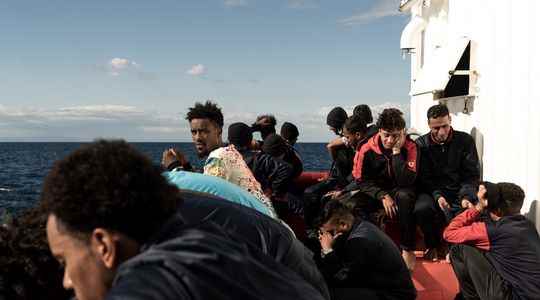The “Aquarius”, the “Open Arms”, the “Lifeline”… and now the “Ocean Viking”. Since October 22, 234 migrants rescued at sea by SOS Méditerranée have been waiting for emergency care, their state of health being seriously affected by their journey and the situation on board the NGO’s rescue boat. Among the survivors – the youngest of them is barely over 3 years old – some are considering jumping into the sea, others have already taken action.
The same NGO, the same refusal by Italy to take charge of the migrants, and even the exchange of arms between Paris and Rome, the crisis of the “Ocean Viking” resembles in all respects that of its predecessor, the Aquarius, another migrant rescue boat, stuck four earlier in the Mediterranean. In the meantime, however, new European positions had to keep these migratory imbroglios at bay. What do these rules say, already undermined by the political and migratory reality?
Last June, during the French Presidency of the Council of the European Union, the Ministers of the Interior of the Member States voted, by a large majority, a “voluntary mechanism of solidarity” intended to relieve the migratory pressure of the countries of southern Europe, countries of arrival in the EU of applicants asylum crossing the Mediterranean. A temporary device which did not prevent a sudden rise in tone between the governments of Emmanuel Macron and Giorgia Meloni.
A mechanism supported by France and welcomed by Italy
The idea, brought forward in its time by Gérald Darmanin, was to organize the relocation of asylum seekers from their country of arrival in the EU, or, at the very least, direct financial aid to the host countries. The device was first to be tested over a year, before being renewed. The Italian Minister of the Interior in office at the time saw it as a “strategic important step towards a European policy of shared management of migratory flows”.
Since then, realpolitik has suddenly taken over. While SOS Méditerranée did request assistance from the “safest, nearest” port, under maritime law and the United Nations Convention on the Law of the Sea, Rome decided that it had shown enough of solidarity. In recent days, Italy has already agreed to disembark, first in small amounts, then all of the “Rise Above” and “Humanity 1”, other NGO ships with on board migrants in distress.
Whatever the mechanism, the far-right government of Giorgia Meloni, has therefore acted that there was no longer any question of “relocation”. Stop showing low blows. The services of the new President of the Italian Council thanked France on Tuesday evening for having agreed to welcome the “Ocean Viking” in one of its ports. A way of forcing the hand of Paris, which never declared taking over the ship, but simply some of the migrants.
Law, the Giorgia Meloni way
For France, which has since denied, this position contravenes the provisions decided in June. “The boat is currently in Italian territorial waters, there are extremely clear European rules which have moreover been accepted by the Italians who are, in fact, the first beneficiary of a European financial solidarity mechanism”, added recalled this Wednesday morning Olivier Véran, considering “unacceptable” the “statements” of the Italian government and its “refusal to let this boat dock”.
An interpretation supported by some experts. “We are witnessing a diplomatic standoff between France and Italy, which opens a breach towards other situations of this kind, because Italy is clearly calling into question the European agreement (of solidarity) which was in its favor”, observes to AFP the specialist researcher at Ifri Matthieur Tardis.
Giorgia Meloni’s Italy actually seems to have its own conceptions of the rules in force. Before returning the responsibility to France, Rome first indicated that the States where the NGO ships were registered should be responsible for the shipwrecked migrants. An aberration in maritime law “As long as they are in the Italian sea, they are subject to Italian jurisdiction”, Francesco Negozio, PhD student and UN expert, told EURACTIV.
How to agree without constraining?
The Italian government is actually stepping into a breach left by international law. When it comes to rescue at sea, nothing is really binding. Starting with the European mechanism. If “the European Commission, in close collaboration with the Member States and with the support of the agencies, is called upon to guarantee the proper coordination of the mechanism and to ensure compliance with the commitments made by the signatory parties”, the latter is voluntary, and ” non-legislative”.
While waiting for the situation to resolve, SOS Méditerranée is heading towards Corsica. “We still have a few hours of discussions left”, before the possible arrival of the boat in French waters “and, in any case, we are still at this stage”, noted Olivier Véran. The latter refuses to accept that migrants land on French soil, an option considered to be able to further weaken the European mechanism. Nevertheless, “no one will let this boat run the slightest risk”, specified the spokesperson for the French government.
